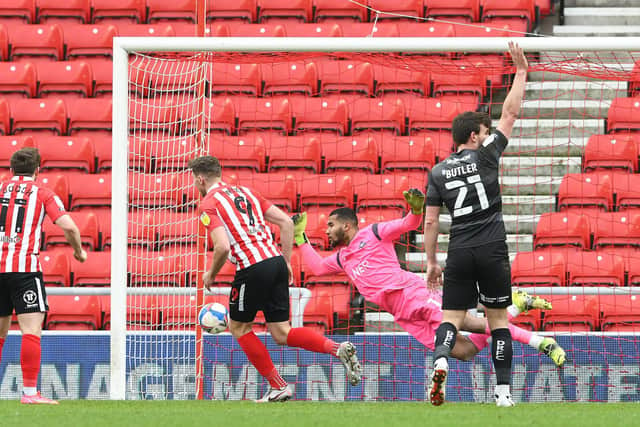Gaping gaps, the big miss, an imperfect storm and time for a change? - Talking points from Doncaster Rovers' horror show at Sunderland
and live on Freeview channel 276
But on this latest big occasion they failed to do that in spectacular fashion against Sunderland to slump to one of the most disappointing and frustrating defeats in recent memory.
There was an absence of their attacking quality and control of possession until the game was already dead and buried as a contest.
Advertisement
Hide AdAdvertisement
Hide AdAnd, most worrying of all, was the woefully flimsy nature of their defending as they laid out the red carpet to concede four identical goals of headstratching awfulness.


This was not Doncaster Rovers. Or, at least, this was not the Doncaster Rovers we have become accustomed to this term.
Following on from another poor defeat at Fleetwood Town in midweek, pressure is now mounting for them to show it simply has been a case of not doing themselves justice and not, in fact, the beginning of a wider problem.
THE ANDERSON FACTOR
It seems somewhat simple to blame the fact Rovers have conceded seven goals in their last two games on the absence of their captain.
Advertisement
Hide AdAdvertisement
Hide Ad

But it is hard to imagine that Rovers would have conceded the four in the manner they did with Tom Anderson on the pitch.
The dominant aerial threat of Charlie Wyke would have been met with another dominant aerial threat in Anderson to ensure while errors may have been made, the same mistake would unlikely have been allowed to occur four times.
Scoring four goals in a match is a special achievement but Wyke is unlikely to have any chance presented to him before the end of the season as easy as any of the four he was served on a silver platter on Saturday.
For the first, he lost his man marker Reece James and got to the ball ahead of Joe Wright, who was on zonal marking duty.
Advertisement
Hide AdAdvertisement
Hide Ad

Then it was all too easy for him to wrestle his way into space against Cameron John for the second.
John failed to track him for the killer third, but the whole back line stopped in the attempt to catch Wyke offside.
And the fourth was arguably the worst, with Wyke in acres of space having failed to be tracked by Andy Butler, while John’s attempts to keep his header out took the ball away from Ellery Balcombe.
All four balls into Wyke were delivered by Aiden McGeady, who showed his quality to turn Brad Halliday inside out. But the failure to provide back up for the right back in his battle with McGeady was criminal.
Advertisement
Hide AdAdvertisement
Hide Ad

Organisationally, Rovers were a shadow of their usual selves as they were so easily picked apart.
And the absence of Anderson - who wins two thirds of his aerial duels on average - was all too apparent.
WHATEVER THE OPPOSITE OF A PERFECT STORM IS
It is fair to say Rovers have not been firing on all cylinders so far in 2021 - despite their excellent sequence of results.
Most games have seen them performing superbly in one aspect of the game and that proving adequate enough to compensate for falling short in another.
Advertisement
Hide AdAdvertisement
Hide AdSo while their defensive resilience was incredible against both Lincoln and Oxford, their work on the ball was below par.
This was a rare occasion when they were poor at both, certainly at key moments – and the situation was exacerbated by two awful penalty misses for Jon Taylor and Jason Lokilo.
When the game was in the balance, they were not nearly incisive enough with their possession play. In a game that threatened to be as wide open as this one, it was more than a little disappointing.
During the first half in particular the movement off the ball was not close to being good enough, with players taking themselves out of contention to receive the pass.
Advertisement
Hide AdAdvertisement
Hide AdIt was only when the game was out of reach that they began to move the ball around well.
With their defensive resilience completely absent, it brought arguably the most disappointing performance of Darren Moore’s time at the club.
TIME FOR A CHANGE?
Cameron John has found himself spotlighted again as the finger of blame searches for one particular culprit among a crowd of guilty faces.
While another pile-on is entirely unnecessary, taking John out of the firing line might not be the worst move Moore could make.
Advertisement
Hide AdAdvertisement
Hide AdWith a newly bolstered number of options at his disposal higher up the pitch, Moore can afford to drop James back in at left back.
John has played a lot of football this season, and the vast majority of it has come away from his natural position.
His development at left back has been good, particularly when it comes to the attacking side of the role.
But he is finding himself under pressure at the moment, targeted by the opposition, and sitting out a game or two may be a prudent course of action.
Advertisement
Hide AdAdvertisement
Hide AdRAYS OF LIGHT
There were indeed a few brief positives to take away from the game for Rovers.
The big one was the return to action of Josh Sims after two months out with a hamstring injury.
On this particular occasion, it was arguably more important to see him get the best part of 40 minutes into his legs, setting himself for a quick return to prominence.
Also positive was the performance of John Bostock following his introduction at the break.
Advertisement
Hide AdAdvertisement
Hide AdHe took on the role of the deepest lying midfielder, often operating inside the Rovers half and using his passing range to help get Rovers on the front foot.
It allowed Matt Smith to take his tenacious approach higher up the pitch and disrupt things, as well as getting Rovers on the ball higher up the pitch.
Bostock has the potential to be a dominant figure in matches, particularly in setting the tone for Rovers and getting them ticking, as he showed here.
*
In these confusing and worrying times, local journalism is more vital than ever. Thanks to everyone who helps us ask the questions that matter by taking out a subscription or buying a paper. We stand together. Nancy Fielder, editor.
Comment Guidelines
National World encourages reader discussion on our stories. User feedback, insights and back-and-forth exchanges add a rich layer of context to reporting. Please review our Community Guidelines before commenting.